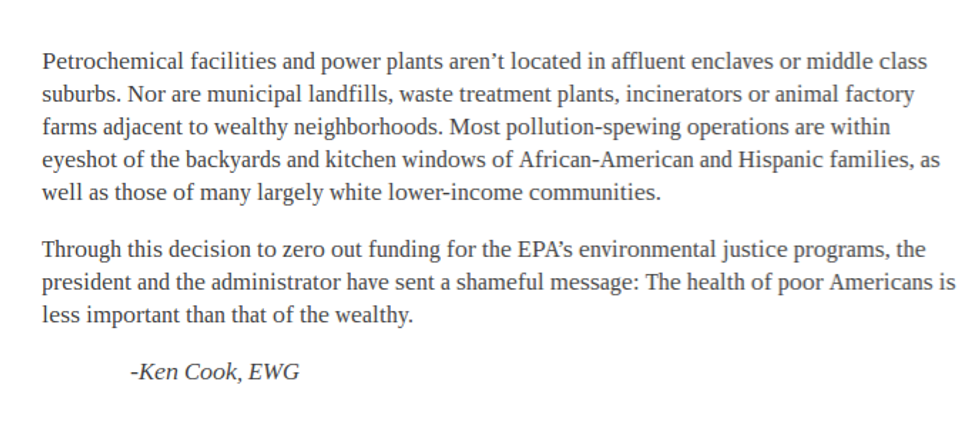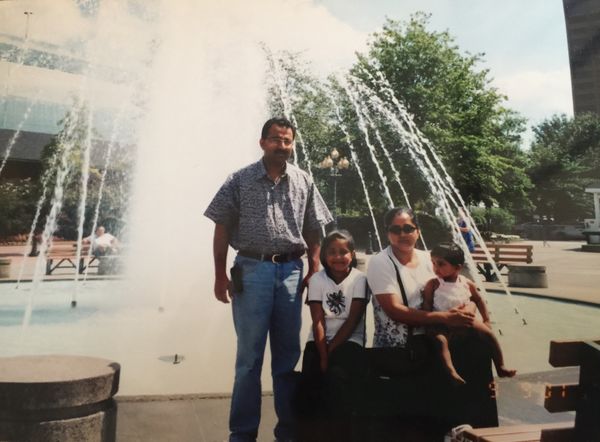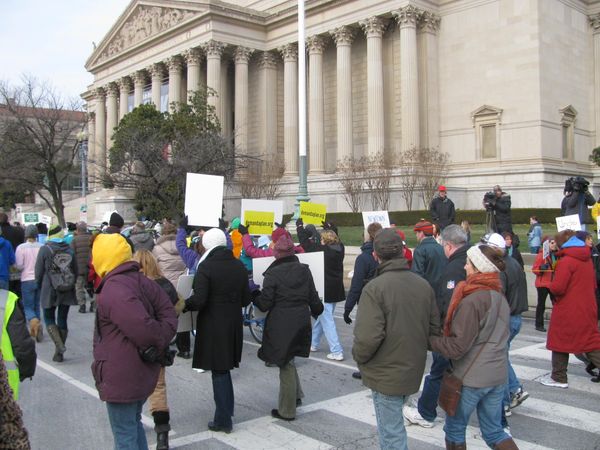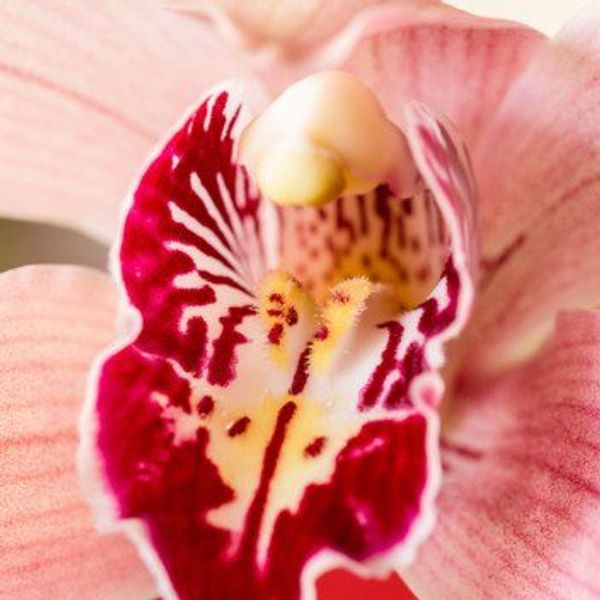The White House budget office is moving forward with Trump's campaign promise to shrink the Environmental Protection Agency. His budget, released this week, included plans to cut 25% of funding and 20% existing staff from the EPA. His plan is eventually to cut its budget by 40%.
The EPA was proposed by Richard Nixon in 1970 as a means of curbing the now-obvious pollution in a newly industrialized world.The EPA creates regulations for air quality, air maintenance, water quality, waste disposal, habitat protection, and other means of pollution. It had become clear that businesses couldn't exactly be trusted to dispose of their waste responsibly, and that industrial plants simply did not care about creating smog-ridden streets so long as their profits were thriving. You know how companies aren't technically allowed to dump all their waste into a wildlife habitat? That's thanks to the EPA.
While it has its flaws, we all agree that protecting the environment and keeping America beautiful (um, and habitable) is pretty important, right? Well, not everyone thinks so. In the words of Congressman Scott Taylor, "EPA regulations hurt profitholders." So I guess the trees can just fend for themselves, and the toxic fumes in the air are just "eh." I mean, I'm sure if it's legitimate pollution, "the body just has a way to shut that whole thing down."
You know how Flint, Michigan's polluted water was kind of a big deal?
It was pretty commonplace before the EPA.
This is a woman Mary Workman in 1973 holding a jar of undrinkable water from her well, before the EPA's work had reached full national scale around 1977
Where is this dystopian hellscape of industrial smog?
It's Cleveland in 1973.
Dumping grounds off the New Jersey turnpike in 1973. The EPA originated the war on litter.
Why would anyone want to live in this world?
Oh wait, I get it.
It's just poor people, man! Let them eat cake. Or, in this case, let them eat smog and poison water.
Jerry Nelson of the Huffington Post zeroes in on Trump's proposal in No Protection For The Poor And Black As Trump Aims To Slash EPA:"This 'zero out' strategy will impact every neighborhood in America. The heaviest burden will be on the lives of low-earning Americans and people of color. Travis Nichols, a Greenpeace USA spokesman, calls the budget cut “environmental racism in action.”
The agency’s 2017 budget is barely over $8 billion — less than 1% of federal spending. The EPA has one of the smallest workforces in the federal government, employing about 15,000 persons."
Trump's March 3rd executive order in addition to the newly released 2018 budget detail plans to cut spending by EPA’s Office of Research and Development (ORD) by more than 40% from roughly $510 million to $290 million. The cuts target scientific work in fields including climate change, air and water quality, and chemical safety. Eliminating important programs tracking pollution, scientific grants, and research studies are building blocks of the larger plan for the coming fiscal year to shrink EPA’s budget by 25%, and to cut its workforce by 20% to 12,400 employees. Cuts of this magnitude could cripple the EPA, rendering it unable to function.
Amid the pending cuts, Mustafa Ali, head of the EPA's Environmental Justice Program, resigned on Thursday, March 16th. Ali was a 24-year veteran of the EPA, former Attorney General of Oklahoma, and the founder of the Environmental Justice Program in 1992.
In a post-resignation interview with Inside Climate News, Ali said that he believes a core function of the EPA is to protect poor and minority neighborhoods from pollution, and he just couldn't sign off on cuts that he knew would hurt those communities. Ali continued, "[The new EPA leaders have not shown] any indication that they are focused or interested in helping those vulnerable communities,' and as such, 'I feel that it’s best if I take my talents elsewhere."
John Coequyt of the Sierra Club also believes there are racial motivations behind efforts to eliminate environmental hazards, which disproportionately affect the neighborhoods of people of color.
“To cut the environmental justice program at EPA is just racist,” Coequyt said in an interview with CNN. “I can’t describe it in any other terms than a move to leave those communities behind. I can’t imagine what the justification would be, other than racism.”
Not sure environmental pollution hits minorities the hardest? Check out these facts.
Goldman Prize: A recent report from the NAACP entitled “Coal Blooded: Putting Profits Before People,” found that among the nearly six million Americans living within three miles of a coal plant, 39% are people of color – a figure that is higher than the 36% proportion of people of color in the total US population. The report also found that 78% of all African Americans live within 30 miles of a coal-fired power plant.
Washington Post: A recent University of Michigan study published in PLOS ONE, reveals a shocking picture of environmental segregation. Specifically, they found that minorities are on average exposed to 38 percent higher levels of outdoor NO2 than whites in the communities where they live, based on demographic data from the 2000 census. [NO2 stands for nitrogen dioxide, produced by cars, construction equipment, and industrial sources.] This disparity is even true for nonwhites in rural areas. Nationwide, the difference in exposure is akin to approximately 7,000 deaths a year from heart disease. On average, within individual urban areas, the disparities in exposure by race were more than two times as large as the disparities by income.
Environmental Health News: The greater the concentration of Hispanics, Asians, African Americans or poor residents in an area, the more likely that potentially dangerous compounds such as vanadium, nitrates, and zinc are in the mix of fine particles they breathe. Census tracts with a greater proportion of Hispanics had significantly higher levels of 11 substances. Communities with larger Asian populations had higher levels of seven components. Asians registered far greater exposures than whites to nickel, nitrate, and vanadium. And areas where more African Americans lived, showed significant elevations in four compounds, including sulfate and zinc.
Cheryl Katz: African Americans are considerably more likely to live in areas with the worst levels of particulates and ozone, the main ingredient of smog, according to a nationwide study by Marie Lynn Miranda and colleagues. Hispanics and low-income residents are... overrepresented in counties with high fine particle pollution. Cancer risks from air toxins such as benzene and formaldehyde are greatest in the nation’s highly segregated areas, according to research by UC Berkeley’s Morello-Frosch and Bill Jesdale. The risks increase with the degree of segregation in all racial and ethnic groups, but are strongest for Hispanics, they found. “Our question was: Are places that are more unequal disproportionately exposing communities of color more than other groups?” Morello-Frosch said. “The answer to that is ‘yes.’ Cities that are more segregated, you see higher pollution burdens for residents of color.”
“Our question was: Are places that are more unequal disproportionately exposing communities of color more than other groups?” Morello-Frosch said. “The answer to that is ‘yes.’"
In a world already drowning under the weight of industrialization, and a world already infected with the smog of environmental segregation, a world increasingly in chaos from climate change, people will die from these policies.
Pollution has very real bodily effects. It's more than just dirty streets, ugly lakes, soot rain, and smog in the sky. It's a family sharing one inhaler for their chronic asthma. It's chronic bronchitis and respiratory disease. It's impaired vision. It's liver disease, kidney failure, and brain damage. It's heart disease. It's birth defects in babies. It's stunted growth in children. It's chronic immune repression. It's anxiety, high blood pressure, digestive issues, hypertension, ulcers, and headaches. It's infertility. It's cancer. It's shorter lifespans. It's death.
It's eugenics disguised as policy.
Environmental segregation is a fact, and eliminating environmental protections will kill the poor. It will imprison minorities in toxic conditions which will become increasingly uninhabitable as the scale of our environmental damage progresses.
It wasn't enough to starve the poor, enslave the poor, not pay the poor, repress the poor, segregate the poor, arrest the poor, beat the poor, and murder the poor- now we want to starve them of the very air they breathe.
When Eric Garner was brutally murdered by a police officer, he cried out, "I can't breathe." Those words became symbolic for Black Americans as a cry against the racism of police brutality.
They could now become symbolic for a different reason.
The chokehold of racism extends beyond the lines of any single policy or institution. As poison fills our cities, those symbolic words decrying racism are doubly true.
Eric Garner is every black American in every city.
There are a million Eric Garners, and they still can't breathe today.




























